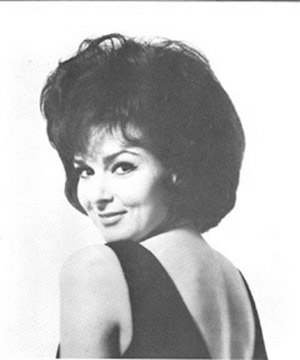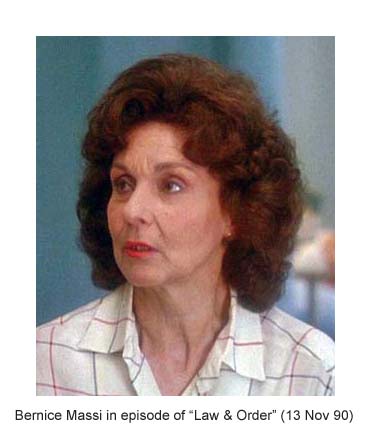|
Bernice |


|
BERNICE MASSI is a singer and actress . She was Miss New Jersey in 1952 and has made numerous appearances on Broadway, on television, and at least once in movies. Perhaps the highlight of her career was her role as Laurette Harrington in the original Broadway cast of the hit musical What Makes Sammy Run? After that hit she appeared opposite Howard Keel as Aldonza in Man of La Mancha. In his autobiography Keel called he ""the best Aldonza of all". Bernice Massi was in the chorus role in the national company of "South Pacific," when she was sixteen. She subsequently appeared in "Wish You Were Here," "By the Beautiful Sea," "Can-Can," "The Vamp" and "Beg, Borrow or Steal." But it was as the very rich Texas girl in Richard Rodgers' "No Strings" that she made her big impact on critics and audiences, prior to her role in What Makes Sammy Run? she also appeared opposite Hugh O'Brian in a summer stock production of "Destry Rides Again." |
|
Bernice
Massi's Broadway Appearances |
|||||||||||||||||||||
|
|
Bernice Massi's Television and Movie Appearances |
|
"Mathnet"
… Hester Phestor (1 episode, 1991)
"Law
& Order" … Mrs. Diamond (1 episode, 1990) |
|
OLIVER! |
||||||||||||||
|
OLIVER!
in June of 1966 at the Valley Forge Music Fair
|
|
Bernice Mssi at thre Papermill Playhoue, Milburn NJ |
| 1966 The Women - Starring Peggy Cass, Sheila MacRae, Phyllis Thaxter, Bernice Massi Directed by Stanley Prager 1982-1983
1988-1989
|
|
Bernice Massi Recordings |
||||||||
Dream Along With Me ( I'm On My Way To A Star ) (1956) by Perry Como.Santa Claus Is Comin' To Town (1959) by Perry Como.Bernice Massi was in the chorus on these recordings as a member of the Ray Charles Singers. |
||||||||
|
||||||||
|
||||||||
|
|
|
TIME Magazine article
about
|
|
Heel's Progress What Makes Sammy Run? is the musical saga of Sammy Glick, who progresses, like a good heel should, from cutting corners to cutting throats. But since the book came out in 1941, something unsettling has happened to the heel; now the question is whether he should be scorned for his gall or admired for his How-to-Succeed spunk, shunned as a social leper or respected as a social dynamo. When the Sammy Clicks and Harry Bogens (I Can Get It for You Wholesale) first appeared in novels, the socio-economic climate was troubled, and heels were regarded as products of "the system," whose hardboiled inhumanity they reflected and whose boils they were. But a healthier social order, not needing to seek someone to blame, absolves the heel of ultra-contemptibility and sees him as merely ultracompetitive. This dates Sammy more destructively than its period-piece spoofing and cigar-chomping producers. One cannot do Once in a Lifetime thrice in a lifetime. People are consumer products to Sammy Glick, and when he has consumed enough—script writers, girl friends, studio chiefs—he reaches the projection room at the top of World Wide Studio. At musical's end, he is faced with the topman cliché: "You're all alone, Sammy Glick." As Sammy, Steve Lawrence moves with the wary savage grace of a jungle cat, and when he claws, he claws. Bernice Massi, the banker's daughter Sammy marries, matches him in velvety ferocity. In a subplot romance, Robert Alda and Sally Ann Howes seem to be going through motions rather than emotions. The two best songs in the score are sexy: A Room Without Windows ("a room without doors") and The Friendliest Thing ("two people can do"). Too many of the lyrics sound like alliances between words that should never have met ("raison d'ètre . . . et cetera"). Two months before curtain time, when Sammy was "in trouble" on the road, Abe Burrows was called in to direct. The Burrows touch has undoubtedly whipped up the pace and flipped up the quips, but the old play doctor was called in too late.. |
|
TIME Magazine article
about
|
|
Big
Funny, Small Funny If someone is going to put a wet diaper in your hand, pick Sandy Dennis to do it. The girl makes it seem like some sort of unpublicized honor. A delectable scatterbrain, she appears to be permanently stalled somewhere between bed and breakfast. Sandy is one of life's winning losers. Her eyes imply that the tear ducts were installed first, and her voice box quivers with a heart broken in transit. Perhaps she is every father's illusion of a vulnerable daughter. Count her a big funny plus in a small funny British comedy import called How the Other Half Loves. Ditto: Phil Silvers. If someone is going to do an in-place jog in your living room in a blue sweatsuit, and rig the timer so that he won't collapse in the middling prime of his life, then why not share the pleasure of Phil's strenuously hilarious company? What with his toothy grin and Dennis' prehensile incisors, the pair might be auditioning for a dentists' convention. The play is about that common sequel to marriage, adultery. To define it further, it is also about that common sequel to adultery—how to keep the spouse from finding out. Silvers is the cuckold. His wife (Bernice Massi) has spent part of the night with a prized employee of his. Among sexual detectives, Silvers rates on a par with Dr. Watson. Only the final curtain brings light to his cloudily creased forehead. This is not a comedy that will incur the enthusiasm of devotees of Aristophanes, Molière, or even Neil Simon. To laugh at How the Other Half Loves is a little like making a midnight raid on the refrigerator, half ashamed but sneakingly satisfied. |